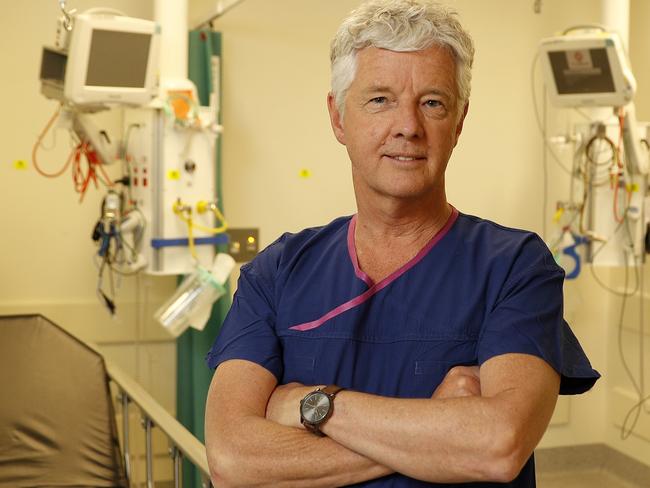Nitrous oxide lifts gloom on treatment-resistant depression
A cheap, safe and readily available drug has for the first time been used to successfully treat a group with depression. After just four 60-minute sessions a fifth went into remission.

Anxiety & Depression
Don't miss out on the headlines from Anxiety & Depression. Followed categories will be added to My News.
A cheap, safe and readily available drug colloquially known as “laughing gas” has for the first time been used to successfully treat a group of people with severe depression in a major Australian study.
Nitrous oxide is called laughing gas because when the anaesthetic drug is inhaled it gives patients a sense of euphoria.
The study involved 81 Victorian adults and found laughing gas could be used to treat a type of long-term depression that does not respond to existing drugs. This drug-resistant depression is more common in women, in particular those who have suffered trauma such as domestic violence.
The “striking” results showed that after just four one-hour sessions around 20 per cent went into remission, while in another 20 per cent their symptoms were significantly reduced.
The research team was led by Monash University professors Paul Myles and Jayashri Kulkarni.

Lead author anaesthetist Professor Myles is a world leader in his specialty and director of research at The Alfred Hospital.
He discussed the results at the Annual Scientific Meeting of the Australian and New Zealand College of Anaesthetists (ANZCA) in Cairns on Tuesday.
Co-author Jayashri Kulkarni is professor of psychiatry at Monash Health and Monash University who has a particular interest in women’s mental health.
They said there was an urgent need for new treatments as mental disorders, depression and anxiety were now major contributors to the global health burden.
“I think the issue is that we cannot expect that all depressions will respond the same to standard treatments,” Professor Kulkarni said.
“So it is critical that there’s research that looks at different avenues of treatment and nitrous oxide is a really good one because it opens up not just a potential treatment modality, but also makes us look at what has gone on in a different way in the brain that has created this particular condition.”

She said patients on the trial had a decrease in depression symptoms as measured by a standardised rating scale and, remarkably, the remission happened early.
Professor Myles said many with treatment-resistant depression suffered sad and debilitating lives because there had not been a drug that had worked for them.
“This affects not only the patient, but also their careers and family, and many are at very high risk of suicide,” Professor Myles said.
The drug has made a difference.
“We contacted people on the trial a day after treatment and asked them how they’re feeling. We had statements like, ‘I was driving home, and for the first time I could see colours’.”
Professor Kulkarni said another told her she suddenly felt like she had a real appetite for life.
“It might sound minor but it really sticks with you when patients who have really had a terrible quality of life and lived life in the grey suddenly come alive.”

In the study the laughing gas was inhaled slowly as the patients sat in a chair and listened to music while being closely supervised.
The authors said strict supervision was key so that patients received the right dose for the right amount of time to avoid abusing the drug or adverse side effects.
The results were published in the journal Biological Psychiatry and concluded laughing gas, which has been around for more than 170 years, helps people with depression to “get back on track”.
“This was more than a pilot study or proof of concept,’ Professor Myles said.
“This is the next step up where we think we’ve opened the door to something that truly has got real potential.”
He said the trial had helped to deliver crucial evidence that the drug had beneficial effects for patients and also confirmed the right concentration and duration needed.
“Now we need to do that large scale trial as quickly as possible to give patients hope.”
The reporter attended the scientific meeting as a guest of ANZCA.
More Coverage
Originally published as Nitrous oxide lifts gloom on treatment-resistant depression





